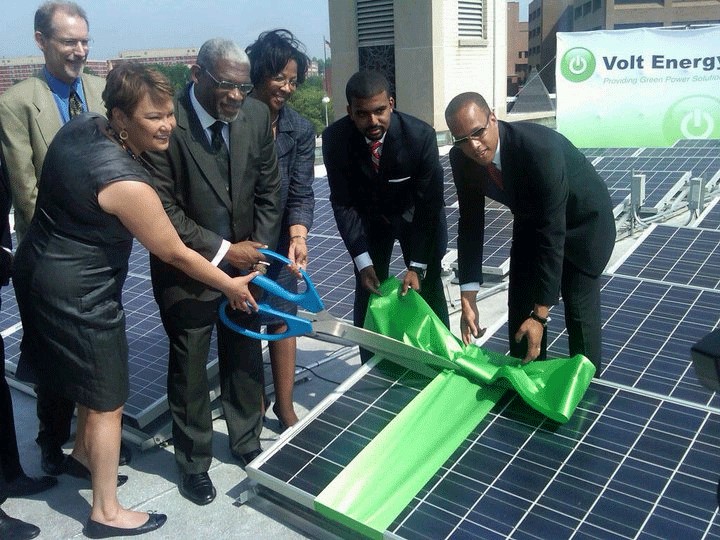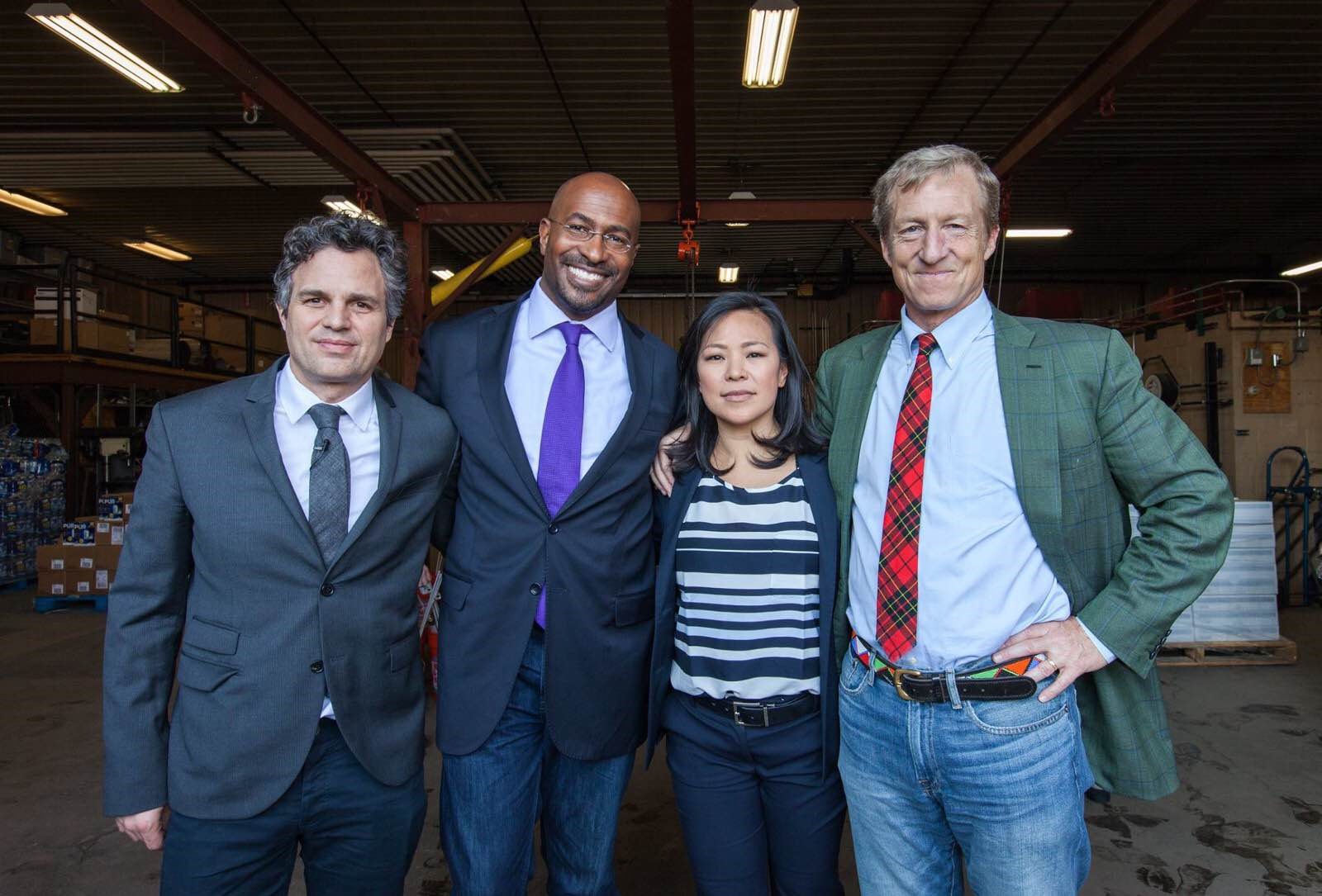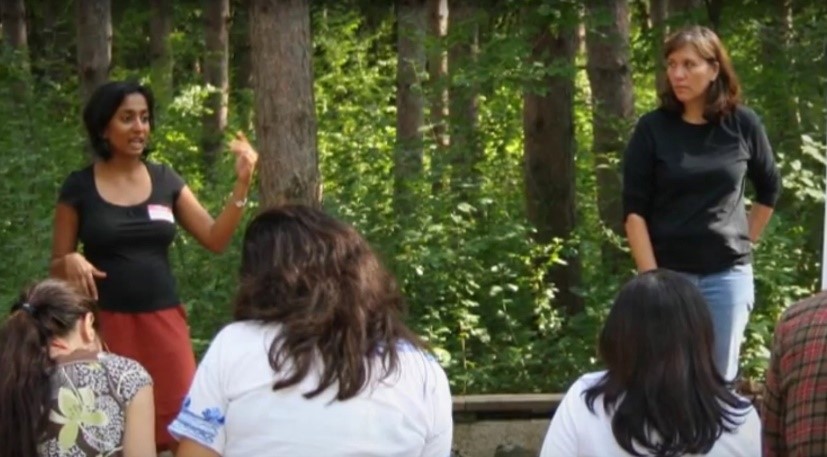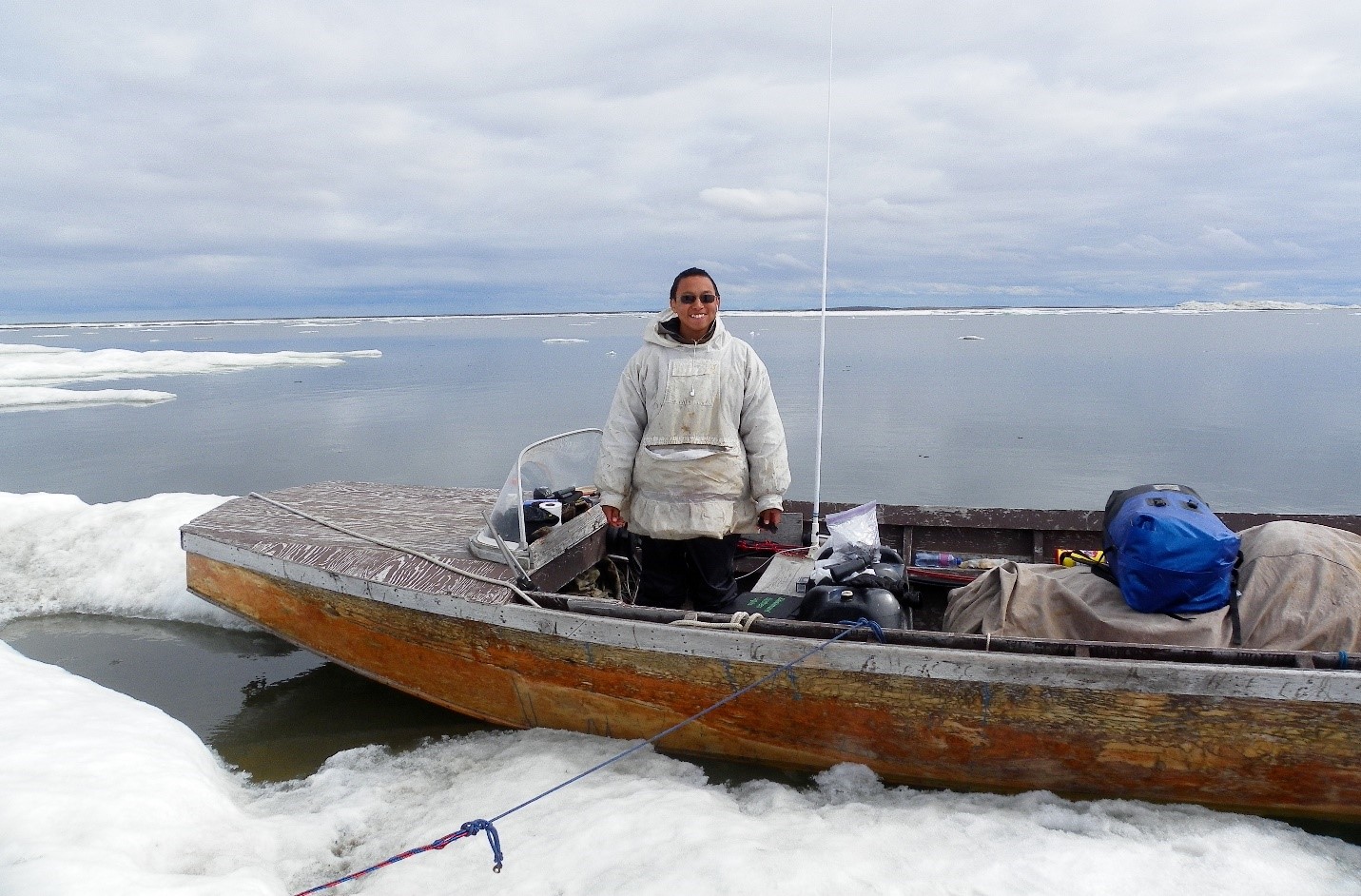
Last month, the White House recognized ten climate equity advocates as “Champions of Change for Climate Equity.” These champions have actively worked to prepare their communities for the existing public health and socioeconomic inequities exacerbated by a changing environment. With champions from Alaska to Massachusetts to Louisiana, these individuals are helping their communities adapt to environmental degradation in all parts of the country. The group came together to share and learn from each other’s mitigation and resilience experiences in order to spread the knowledge necessary to prepare, adapt, and thrive in underserved communities. The event featured remarks from Valerie Jarrett, Christy Goldfuss, Dr. John Holdren and actor Laz Alonso, among others.
The following are reflections shared with us by the Champions of Change for Climate Equity:
Gilbert Campbell
In 2009, I launched Volt Energy, along with my Howard University classmate and good friend, Antonio Francis. Antonio and I had a vision to start a business that would not only be profitable but, more importantly, have a positive impact in the community and the world that we live in. Little did we know that two first generation African-American entrepreneurs with an ambitious goal would be afforded the opportunity to provide clean energy to clients all over the country. Our clients include major corporations, municipalities, educational institutions, and non-profits.
One of the most fulfilling projects that we have completed was installing solar energy at Florida Avenue Baptist Church, in Washington, D.C., in 2011. Florida Avenue Baptist has the distinction of becoming the first African-American church in the nation’s capital to install solar energy. I am proud to say that Florida Avenue Baptist is realizing significant energy savings, has an active green ministry, and is educating other inner city churches on the benefits of renewable energy. This project also garnered national attention and was featured on the PBS special “America Revealed.”
As a young entrepreneur in an emerging industry, I am extremely passionate about encouraging other minorities to explore clean tech as a business and/or career opportunity. I frequently address and mentor young people across the country about the tremendous opportunities they have as clean energy revitalizes our country’s infrastructure.
I am also a champion in advocating for contracting opportunities for diverse businesses in clean tech. A lot of wealth creation has stemmed from the clean tech boom over the last few years but minority entrepreneurs lag behind due to a lack of contracting opportunities. I have been fortunate to leverage my platform to have open dialogue with senior executives of major corporations, government leaders, and other key stakeholders, as I endeavor to build stronger ladders of opportunities for other minority businesses in this space.

(left to right) Former EPA Administrator Lisa P. Jackson; Dr. Earl Trent, pastor, Florida Avenue Baptist Church; Dr. Janice R. Trent, first lady, Florida Avenue Baptist Church; Gilbert Campbell, III, co-owner, Volt Energy, LLC; and Antonio Francis, co-owner, Volt Energy, LLC
Gilbert Campbell is a co-founder and principal of Volt Energy.
Michael Green
Boston-based Climate Action Business Association (CABA) focuses on supporting local members in taking targeted action on climate change. CABA’s own metrics-driven sustainability program helps businesses set goals, track their progress, and achieve measurable results, using a proprietary sustainability data management tool. CABA supports local small businesses as they reduce their carbon footprints while improving their bottom lines. CABA also assists member businesses in identifying and acting on opportunities to advocate for better climate policies and understand the political landscape. Its unique approach balances member education, public outreach, and dialogue with officials, and publicity about successful business and community climate change initiatives.
This summer CABA is launching the second annual Massachusetts Businesses Acting on Rising Seas (BARS). The goal of the campaign is to get much needed resiliency and preparedness information to commercial districts that are at high risk for rising seas and extreme weather. Teams will be dispatched into small coastal towns to speak one on one with business owners and managers. A key part of the campaign is the resiliency guide, which outlines easy steps businesses can take right away and educates them on their level of risk due to the consequences of climate change.
The campaign kicked off in the Boston metro area, but will also reach out to neighboring towns such as Winthrop, Revere, Quincy, Newburyport, Gloucester, New Bedford, and Provincetown as the summer progresses.
CABA is aiming to prevent the loss of local business and support a secure economy for the state in the event of a natural disaster. Although this may seem like a far off scenario, Boston could potentially see a storm with flooding of about 7.5 feet within the next 6 years. As a result, we want to better prepare businesses and ensure that they have a plan. With this campaign, we can build a better understanding of climate resilience and a sense of community in the city of Boston and along the coast of Massachusetts.
Michael Green is the Executive Director of Climate Action Business Association.
Desiree Williams-Rajee
When I first moved to Portland years ago, I was bright-eyed at the opportunity to find work in the city renown for sustainable innovation. Sustainability, as I understood, was the justice movement being led by brown folks globally to bring about human well-being, while preserving the earth’s resources. It did not take long to discover in Portland the people who benefited from sustainability initiatives did not look like me; the color green was in fact synonymous with the color white and other prickly nouns like exclusion and gentrification. Therefore, when the opportunity arose, I was intent that our new Climate Action Plan would serve to correct that imbalance.
As a Black/Filipina mother of two, my identity, my ancestry, and my children are the underlying drive and inspiration for everything that I do. My ancestors worked from farms to factories, served as community healers and patriots. They lived in love for their communities and the earth. They fought for freedom, justice, and self-determination despite the sharp hooks of racism that would try to hold them back.
I am so honored that the White House is recognizing this work. It is the work of changing people's hearts and minds to think creatively about how collectively we can be a better version of ourselves, but it is also a part of a story that started lifetimes before me and I hope will be in service to generations to come.
I want to thank the organizations who participated, the Asian Pacific American Network of Oregon (APANO), Coalition of Communities of Color, Groundwork Portland, Upstream Public Health, and Wisdom of the Elders. More information on the details of the equity integration project and its outcomes can be found online at www.portlandoregon.gov/bps/climateequity
Desirée Williams-Rajee is the Equity Specialist for the City of Portland Bureau of Planning and Sustainability.
Kristin Baja
Since a young age, I have been passionate about protecting the environment and interacting with people. I loved being outside and exploring, especially during storms when my fascination with cloud formations and heavy downpours brought me home drenched more than once. Despite the risks my community faced, I grew up confident that things would turn out okay. As an adult, I now understand the privilege that allowed me to be fascinated by storms rather than worry about how my family would cope.
In Baltimore, as is true in most cities, the impacts of climate change are not experienced evenly across residents. Not all citizens can turn up the air conditioning in the summer, or find alternative housing when flooding becomes common.
One of the things I am most passionate about in my work is finding innovative and relevant ways to enable government and stakeholders to work together to find solutions that are proactive and fair. I see my role as that of a listener, story collector, connector and enabler of positive change. This involves findings ways to broaden access to climate science and create meaningful opportunities for mutual engagement – where communities and government officials jointly develop and implement plans to lessen future threats. Proactive planning and collaborative implementation is essential for combating Baltimore’s unique set of shocks and stresses and making the city more sustainable and resilient.
Kristin Baja is the Climate and Resilience Planner for the City of Baltimore, Office of Sustainability. She is a Certified Floodplain Manager and Climate Preparedness co-chair for the Urban Sustainability Directors Network.
Michael Durglo
First, I would like to say that it was very much an honor to be selected as a Champion of Change for Climate Equity and to be there at the White House. I was however somewhat disappointed that I did not get to play nine holes of golf with the President. (Kidding)
As I said during the panel discussion, I do not do what I do to be recognized or for prestige – I do it because I believe that we can make a difference in climate change impacts to our people and that we must take responsibility for our actions and make this Mother Earth a better place for our future generations.
I have been working for the Confederated Salish and Kootenai Tribes for over 30 years in different capacities. I have been doing work in Climate Change planning for the last four years. This work is not just within our organization but also with many Tribes throughout the United States and Canada.
This past year we started a program called Environmental Advocates for Global and Local Ecological Sustainability (EAGLES). The purpose of this effort is to help empower interested local youth to become informed, engaged citizens regarding environmental and climate change issues at the Reservation, State, Regional, National, and Global level. We want to help youth understand that environmental issues such as climate change are complex but basic to all life and involve multi-disciplinary scientific, cultural, historical, societal, academic, legal, and even artistic aspects. We want to help youth become aware of the many environmentally related jobs and careers and to encourage their academic and career exploration, motivation and planning.
The environmental and climate change issues facing the Flathead Reservation and world at every level are a steadily growing focus of concern and discussion. Climate scientists, policymakers and others are increasingly recognizing traditional Knowledge regarding these issues as essential to identifying needed solutions.
I believe that the sacred circle is broken and it is up to us to mend it. We must reconnect with our Mother Earth!
Michael Durglo is Division of Environmental Protection Manager for the Confederated Salish and Kootenai Tribes.
Susana De Anda
During California’s drought, I have been working alongside the rural, low-income communities and communities of color that have been hit hardest by dry wells and increasingly contaminated drinking water supplies. I have dedicated the past decade to ensuring that every Californian has access to safe, clean, and affordable drinking water, because even during non-drought years, over one million Californians are impacted by contaminated drinking water in their homes, schools, and workplaces.
The drought has laid bare the extreme climate vulnerability of rural, low-income communities in the San Joaquin Valley. At the Community Water Center, we are working to ensure these residents are at the decision-making table so their communities can emerge from this drought more resilient to climate change. With more frequent and intense droughts expected, I am working with local residents to ensure lawmakers create a sustainable funding source to address California communities’ long-term drinking water needs, including water system operation and maintenance costs. Securing a reliable water supply is crucial to advancing climate equity and ensuring that the frontline communities right here in California that are most vulnerable to this global climate crisis have a sustainable future.
Susana De Anda is Co-Founder and Co-Executive Director of the Community Water Center, a nonprofit environmental justice organization based in California’s San Joaquin Valley, whose mission is to act as a catalyst for community-driven water solutions through organizing, education, and advocacy.
Colette Pichon Battle
Like every other Black woman justice fighter, I assumed that a call from the White House simply meant that someone had finally given Michelle Obama my phone number. The call was not from the first lady, but it was something almost as rare and amazing: a Champion of Change Award given by the White House to regular folks working for climate equity.
Connection to these other climate equity communities comes after a 10-year shared struggle for equity from the nation’s greatest climate-based disaster (Katrina) and the nation’s largest oil drilling disaster (BP/Transocean/Halliburton).
The words from Senior Advisor Valerie Jarrett, actor Las Alanzo, and all of the 2016 Climate Equity Champions of Change confirm that our nation and our planet are at a critical junction. We have another choice.
The people of the Gulf, the people in the streets and people across the planet need us to shift our path to power- for the good of the planet and for the good of our humanity. We have the opportunity to do something “super” with our national power. The 2016 Climate Equity Champions of Change have chosen to root our work in principles that sustain life, flow together to common places, offer peace and promote freedom. Each spoke from deep love, a respect for all life and the humility to admit that we all need each other. This was the greatness being honored.
And I offer my sincere gratitude for all the leaders moving in peace, in freedom and like the water. The seas are rising … AND SO ARE WE!
Colette Pichon Battle is the founder of the Gulf Coast Center for Law & Policy.
Vien Truong
My work is an extension of my life. I am the youngest of eleven kids, born to a refugee family that fled war torn Vietnam. I didn’t initially understand that there was anything abnormal about my upbringing: spending my first few years on my mother’s back as she picked strawberries and snow peas in the pesticide-ridden fields of Oregon, and then later on watching - and eventually helping - as my parents labored away in the sweatshops in West Oakland, one of the poorest and most polluted communities in California.
It was not until I was able to travel and live in other parts of the United States that I began understanding that these conditions were abnormal. I decided to dedicate my life to alleviating poverty and building the beloved communities that Dr. Martin Luther King envisioned.
One of the proudest moments of my life was helping to pass a landmark community reinvestment bill in California that created a polluters pay fund, which has created the largest fund in history for low-income communities to green up and to create economic revitalization for residents. In the last two years, it directed over $900 million into the poorest and most polluted communities in California. Now, I am privileged to be leading Green For All to create national programs that will prioritize low-income communities and communities of color in the crafting of policy across the country.

Vien Truong leads Green For All, a national initiative that puts communities of color at the forefront of the climate movement and equality at the center of environmental solutions. She lives in East Oakland, California with her husband and twin three-year old boys.
Dr. Cecilia Martinez
I was raised in the mountains of northern New Mexico, and from a young age was taught that respect for the Earth. I acknowledge the sacrifices of my family and friends who brought me to this moment. Building an equitable and just climate future will require that all our voices are heard, which also means that we should reject any efforts to diminish our political agency. We are, indeed, at a crossroads on how we will move forward to address one of the most challenging social and environmental problems in history. The beauty of our diversity has always been in our ability to create resilient communities that are constantly evolving and changing and that honor the history and traditions of all peoples. The activism being undertaken by women, Indigenous, communities of color, and youth from around the world are leading the way in addressing climate change in just and sustainable ways. After all, justice is a cornerstone principle of all democracies. Achieving climate equity is about respect, inclusion and collective action. The community work happening all across the country is a testament to what is possible.

Dr. Cecilia Martinez is the co-founder and Director of Research Programs at the Center for Earth, Energy and Democracy
Esau Sinnok
Welcome to Shishmaref, Alaska, population: 650. We are a small Iñupiaq community where everyone knows each other. Shishmaref is a barrier island that has been eroding and flooding since the 20th century, even before climate disruption was widely recognized. Over the past 60 years, we have lost 2,500 to 3,000 feet of land. I was born in 1997 and over the course of my lifetime, Shishmaref has lost about 100 feet of land.
Within the next two decades, the whole island will erode away completely and become uninhabitable. As if that is not scary enough, Shell Oil recently attempted to drill oil from the Chukchi Sea near Alaska. Had the company succeeded, it would have been deadly for our marine animals and our subsistence diet.
Everyone in Shishmaref is friendly and like family. If we move away, everything will change. We will not see each other as much, and we will not interact the way we do now. It really hurts knowing that your only home is going to be gone, and you will not hunt, fish, and carry on traditions the way that you are accustomed to and that your people have done for thousands of years.
I invite any climate skeptics to come to Shishmaref and find out what this place looked like even 50 years ago and see what we are going through now. Once you see how vulnerable my community is to sea-level rise and erosion, you cannot deny that climate disruption is real. Despite this reality, I appreciate every day that I get to wake up and see the scenery that is still here and that I am able to call this place home for now.
That is why I am determined to speak up for my community. The youth are the future of Alaska, so it is important for us to get involved. Youth are very strong in my opinion, and no matter where we are, we can work to make change happen. One day I hope to run for Governor of Alaska to improve the lives of Alaskans and make a difference for native peoples disproportionately affected by climate disruption in Alaska and the world.

Esau Sinnok is an Arctic Youth Ambassador.

